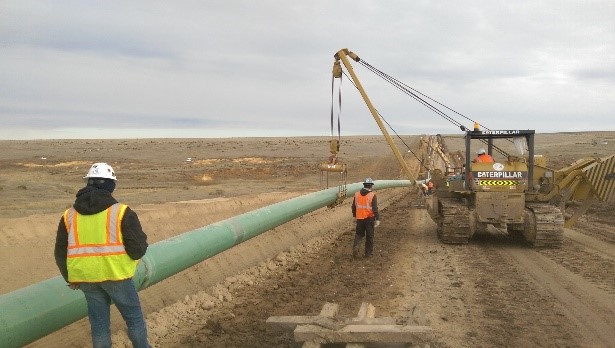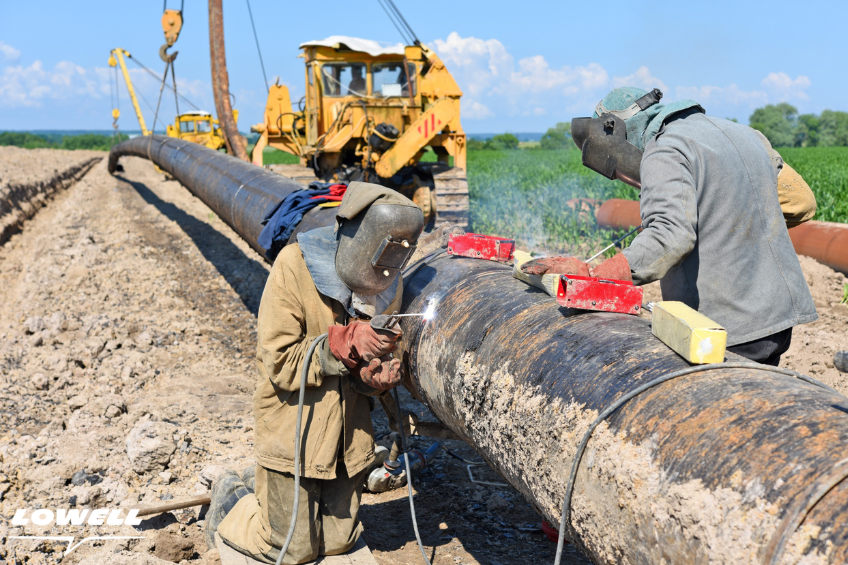A Comprehensive Overview to Comprehending Pipes and Their Duty in Construction
Pipelines are necessary parts in building, serving crucial features in waste, gas, and water management. Their choice and application can substantially affect a building's efficiency and safety and security. Numerous products, such as PVC, copper, and PEX, use distinct advantages suited to specific demands (Creek Pipe Texas). Comprehending these aspects is vital for any construction job. As one explores the intricacies of pipelines, the implications for compliance and public health come to be progressively evident
The Value of Pipeline in Building and construction
Pipelines work as vital avenues in construction, assisting in the motion of water, gas, and waste throughout buildings and facilities. Their function prolongs past simple transportation; they are vital for making sure the functionality and safety of commercial and residential atmospheres. Effectively set up pipes add to the effective distribution of resources, allowing day-to-day activities such as food preparation, showering, and heating. Moreover, pipes play a crucial role in waste management, making certain that sewage and wastewater are efficiently gotten rid of from living spaces.The significance of pipelines is additionally mirrored in their effect on public health and wellness. Damaged or insufficient piping systems can lead to contamination and hazardous problems, making high quality materials and installment techniques crucial. In addition, pipes need to follow various structure codes and policies, which are created to secure both passengers and the atmosphere. Subsequently, the importance of pipes in construction includes both sensible capability and important health factors to consider.
Types of Piping Used in Building Jobs
Numerous sorts of pipelines play a considerable function in structure jobs, each designed to fulfill certain requirements and applications. Among one of the most generally made use of pipe types are PVC, which is light-weight and resistant to corrosion, making it excellent for water drainage and air vent systems. CPVC pipes, comparable to PVC, can hold up against higher temperatures, frequently made use of in hot water systems. Copper pipelines are recognized for their resilience and integrity, frequently employed in plumbing and heating applications. Galvanized steel pipes, while less typical today, were when a criterion for water lines due to their toughness. Furthermore, PEX (cross-linked polyethylene) pipes are getting appeal for property pipes due to their versatility and resistance to scaling and chlorine. Cast iron pipes are preferred for their sound-dampening buildings, typically utilized in waste and dirt systems. Each pipeline kind serves distinctive functions, ensuring efficient procedure in construction jobs.
Typical Products for Piping and Their Feature
In building and construction, the choice of pipe products is vital for making sure longevity and capability. Metal pipes provide toughness and resistance to high stress, while plastic pipelines supply corrosion-resistant and light-weight choices. Compound pipes combine the advantages of both materials, making them versatile options for various applications.
Metal Pipeline Options
Metal pipelines are essential parts in construction, supplying a variety of alternatives that deal with ecological conditions and various applications. One of the most typical products consist of steel, copper, and cast iron. Steel pipes are known for their strength and resilience, making them ideal for high-pressure applications. Copper pipelines are preferred for their deterioration resistance and antimicrobial residential properties, commonly used in plumbing systems. Cast iron pipelines provide superb audio insulation and are excellent for waste and drainage systems. Each steel kind has unique benefits; for instance, galvanized steel can resist corrosion, while stainless steel provides premium rust resistance. Choosing the appropriate metal pipeline relies on variables such as price, ecological exposure, and the details needs of the construction project.

Plastic Pipeline Advantages
Plastic pipes have acquired popularity in building as a result of their lightweight nature and convenience. These pipes, made from products such as PVC, CPVC, and PE, deal superb resistance to corrosion and chemical damages, making them suitable for different applications. Their ease of installment more improves their allure, as they can be reduced and joined without unique tools. Additionally, plastic pipes are typically extra cost-effective compared to steel choices, adding to lower general project expenditures. Their smooth interior surfaces minimize friction and improve circulation prices, while insulation residential properties assist keep temperature control in pipes systems - Creek Pipe Company. With a variety of dimensions and configurations available, plastic pipes successfully satisfy the varied demands of modern building jobs
Compound Pipeline Characteristics
Composite pipelines integrate various materials to leverage their individual toughness, resulting in enhanced performance and durability. Commonly, these pipelines contain layers that might include plastics, ceramics, and metals, each contributing one-of-a-kind properties. For circumstances, the internal layer may be made from a corrosion-resistant material, while the external layer provides strength and effect visit here resistance. This combination permits composite pipes to endure severe temperatures and stress, making them appropriate for a variety of applications, including water and commercial procedures. Additionally, composite pipelines are usually lighter than traditional materials, promoting less complicated handling and installment. Their convenience and flexibility to various atmospheres make them a favored choice in modern construction jobs, making sure longevity and performance in liquid transportation systems.
Applications of Water Lines in Pipes Equipments

Electrical Avenues: The Duty of Water Lines in Electrical wiring
In contemporary building and construction, electrical channels play an important role in ensuring the safe and efficient transmitting of electrical circuitry throughout buildings. These pipes offer a protective path for electrical wires, securing them from physical damage and environmental aspects. Different materials, such as PVC, steel, and flexible channels, are made use of relying on the specific needs of the installation.Furthermore, avenues aid in arranging circuitry systems, reducing the danger of electrical dangers like short circuits or fires. They likewise promote simpler upkeep and upgrades, as cords can be accessed and replaced without significant disturbance to the structure.Proper installation of electric channels is essential for conformity with building regulations and safety regulations. This organized you can check here strategy not just improves the long life of the electrical system but also adds to the general safety and performance of the structure, making electrical conduits essential in contemporary building and construction methods.
Choosing the Right Pipeline for Your Project
Just how can one assure the right pipe selection for a building task? The selection process begins with understanding the particular requirements of the job, including the type of fluids being delivered, stress ratings, and environmental problems. Material choices, such as Steel, copper, and pvc, need to be assessed based on toughness, rust resistance, and thermal properties.Next, one need to think about the pipe's size and flow capability to determine effective procedure. Regulative criteria and codes should likewise be followed, as they determine the acceptable materials and methods for details applications. Consulting with professionals and making use of extensive resources can better help in making educated decisions.Finally, assessing the cost-effectiveness of various choices is crucial, stabilizing initial costs with lasting maintenance and replacement prices - Creek Pipe Midland. By thoroughly analyzing these factors, one can confidently choose the most ideal pipe for their building project, ensuring both functionality and compliance

Upkeep and Examination of Piping in Construction
Correct selection of pipes sets the foundation for their long-term efficiency, making upkeep and inspection crucial elements in construction. Regular upkeep assurances that any kind of potential concerns, such as leaks, corrosion, or clogs, are recognized and addressed promptly, minimizing pricey repair services and job hold-ups. Scheduled evaluations, consisting of visual analyses and pressure tests, play an essential duty in evaluating the integrity of pipeline systems.Additionally, keeping an eye on ecological factors, such as temperature variations and dirt problems, can aid prepare for deterioration. Utilizing innovative modern technologies, such as CCTV for indoor examinations, can improve the efficiency of upkeep initiatives. It is vital to record assessment findings and maintenance tasks to develop a complete background of the pipe systems. By prioritizing maintenance and evaluation, construction professionals can expand the lifespan of their piping systems, guaranteeing they run successfully and reliably throughout the task's period.
Regularly Asked Questions
Exactly How Do Pipelines Influence Energy Effectiveness in Buildings?
Pipelines considerably influence energy effectiveness in structures by controling home our website heating and cooling systems. Appropriate insulation and products decrease energy loss, while effective pipes styles lessen water usage, ultimately resulting in reduced energy consumption and operational expenses.
What Rules Govern Pipeline Installation in Construction?
Laws governing pipe installment in building generally include nationwide and regional building ordinance, pipes codes, and security criteria. These warranty compliance with structural integrity, product specifications, and wellness needs, promoting safety and security and effectiveness in building and construction techniques.
Can Pipeline Be Recycled After Usage?
The concern of pipeline recyclability is substantial. Several materials, such as steel and particular plastics, can be recycled effectively. However, the condition and kind of pipe influence recycling usefulness, demanding proper assessment prior to disposal.
Just How Do Weather Impact Pipeline Efficiency?
Weather significantly influence pipeline performance. Extreme temperature levels can create development or contraction, while moisture may cause rust. Furthermore, heavy precipitation can boost soil pressure, impacting security and general functionality of the piping system.
What Are the Signs of Pipe Failure to Expect?
Indications of pipe failure include leaks, unusual sounds, staining of water, minimized water stress, and visible corrosion. Normal examinations can help find these issues early, protecting against costly fixings and making certain system capability in the long term. Pipelines play an essential duty in waste monitoring, making certain that sewage and wastewater are successfully eliminated from living spaces.The significance of pipes is likewise shown in their influence on public health and wellness. In building and construction, the choice of pipeline products is vital for making sure resilience and functionality. Steel pipelines supply stamina and resistance to high pressures, while plastic pipelines give corrosion-resistant and light-weight alternatives. In addition, pipes are utilized to get rid of wastewater, connecting toilets, sinks, and drains to local sewage systems or septic tanks.Different types of pipes, such as PVC, copper, and PEX, are selected based on variables like longevity, expense, and particular application needs. Just how can one assure the right pipe choice for a building task?